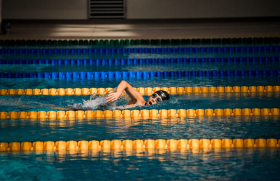Conquering pre-competition jitters: Tips for athletes
Published: October 19, 2023
Even the top athletes in the world can get nervous when they’re getting ready for a competition. In fact, one of the biggest differences between top performers and middle-of-the-road players is not talent. It’s the ability to perform under pressure when these jitters are at their worst.
People who are not top athletes can still feel these jitters in seemingly normal situations. Getting ready to place a bet on a game can be enough for some people to get nervous. Luckily, there are plenty of effective ways to deal with these pre-competition jitters.
Stretching & Other Light Movements
The anxiety that many athletes feel before a competition usually disappears once the game starts when they feel in their element. One of the ways to deal with the jitters is to get the body moving beforehand to help the mind think it’s “go time” already.
If this is the way that an athlete chooses to get rid of the jitters, though, they have to be very careful not to overwork themselves. That’s why stretching is one of the best ways to get active without using too much energy. Ironically enough, some athletes will perform better when they are a bit tired, but these are special cases.
The “light movements” that athletes can do to get rid of the jitters will vary depending on the sport that they’re playing.
Sprinters, for example, don’t fall in that category of benefiting from being a bit tired. In those cases, stretching and listening to music while doing so can be the perfect antidote to the jitters.
Music is the Safe Space of Many Athletes
Great athletes such as Michael Jordan and Michael Phelps have been pictured with headphones on before a competition. That’s a perfect example of them using music as a way to get in the right headspace before a competition. What type of music is going to work best?
That’s a very personal question that each athlete should figure out on their own. As a general rule, though, boxers or MMA fighters will typically benefit from more loud, intense music. They’re probably looking to build a sense of aggression before the fight that can also help them cope with the jitters.
Golfers, on the other hand, may want to stick to some low-intensity jazz or classical music. Athletes who need to find a balance between intensity and peace of mind before their event may have a tougher time finding the right type of music to listen to.
Whatever they ultimately pick, the way that music allows people to disconnect from the world makes it a great option for the jitters.
Stay Hydrated
This is another method to avoid pre-competition jitters that could backfire on some people. There’s a physiological reason why athletes will want to stay hydrated before a competition. When someone is properly hydrated, they are less likely to cramp up during the competition.
The jitters can sometimes be felt by the muscles contracting. That’s one of the biggest problems that athletes have to contend with.
If the muscles contract, injuries are more likely to appear, and of course, it’s just harder to perform when the muscles are not responding correctly.
As was the case with the “light movements” advice, this “staying hydrated” idea works best when there’s a good balance. Gymnasts, for example, may have a tougher time going to the bathroom if they’ve put their uniforms on already. The same issue can haunt other types of athletes.
To be able to find this balance, it could be a good idea to drink something with plenty of electrolytes and a touch of sugar. That way, it’ll be easier to stay hydrated without necessarily having too much fluids in the body, which will make the athlete want to visit the restroom constantly.
This advice is universal for all types of activities, even if you are sitting on a sofa, or reading the article about simulated soccer.
What to Eat Before a Competition
Many people are going to recommend having a big bowl of pasta before a competition. This is a good idea a few hours before the event so that athletes can get all the carbs they need to perform.
However, it won’t be a great idea to fill up on spaghetti a few minutes before jumping onto the field to deal with the jitters.
When the competition is just a couple of minutes away, it could be a good idea to have a protein bar or another type of light snack. It’s not bad to have at least a little sugar before a big event. That can provide that extra energy boost that the athlete may need.
Another popular “meal” before a competition is chewing gum. It can help with the jitters because it keeps the body moving and the mind a bit occupied. The problem with chewing gum is that it can make people thirsty, which can bring up another set of issues that the athlete will have to deal with.
Is Studying the Game Plan a Good Idea?
Some athletes will benefit a ton from doing extra preparation right before the event. They can feel more in control, which will put them at ease, especially if they’re getting some jitters. This piece of advice, though, can have the opposite effect on other athletes.
There are some people out there who would overthink the situation if they had to go through their notes one last time. Coaches and athletes themselves are truly going to benefit from understanding what may hurt or help them pre-competition in this department.
Final Thoughts on Pre-Competition Jitters
These tips can apply to both athletes and people in daily situations that can seem stressful. The common denominator in all of these cases is finding a sense of balance. Perhaps it’s even more important, though, to build a personal routine for these scenarios.
In stress-filled environments, it always helps to find familiarity, which can be comforting. That’s why many of the top athletes across history have always kept pre-game routines. These activities helped remind them that what was about to happen was just another day at the office.
It’s also good to remind athletes that the jitters can be something even the great ones feel. There’s no shame in being a little nervous. As was hopefully made clear, there are ways to effectively deal with the jitters if they do appear.
- 22yo Nigerian attacker involved in Arsenal's final training session before trip to Ipswich Town
- Ola Aina shares favourite Nottingham Forest moment, unsung hero, Team of the Season pick and more
- Eric Chelle handed fitness boost as Slavia's Igoh Ogbu makes injury return ahead of Unity Cup
- After logging 1662 minutes, Chelsea loanee who has chosen France over Nigeria scores first PL goal
- 'I'm joining the petition' - Newcastle star wants to see Murphy in England squad amid Nigeria interest
- Nigeria 4 Algeria 0: Joseph brace, Raji and Animashaun goals put Flamingos on brink of WWC qualification
- Super Eagles striker Sadiq saves the day again for Valencia in 1-1 draw against Rayo Vallecano
- 'May God give everyone a son-in-law like Osimhen' - Ex-referee calls Galatasaray striker a dream signing
- Meet the future stars: Five Flying Eagles players to watch at 2025 U20 Afcon
- Opposition watch: Morocco include PSG, Monaco, Marseille players in star-studded squad for U20 Afcon
 Football News 24/7
Football News 24/7

- Football Betting
- African Players
- Australia/ Asia
- Belgian Championship
- Bundesliga
- Danish Football
- English Premier League
- Nigeria National Teams
- Casinos not on Gamstop
- Nigeria Premier League
- Norwegian Football
- Polish Football
- Russian Championship
- Serie A
- Spanish Liga
- Swedish Championship
- Transfer
- Turkish Championship
- 1Win
- Ukrainian Football
- Uncategorized
- Women's Football
- hi88
- hi88
- hi88
- hi88

